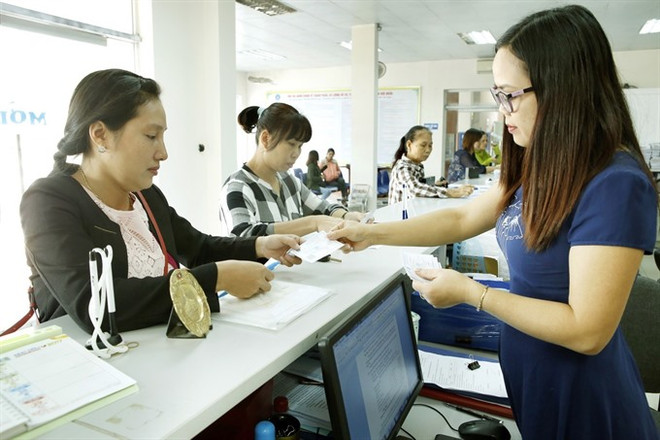 A worker of Phu Tho Social Insurance Agency talks to a social-insurance user in northern Phu Tho province (Photo: VNA)
A worker of Phu Tho Social Insurance Agency talks to a social-insurance user in northern Phu Tho province (Photo: VNA)Hanoi (VNA) - Vietnamcan and should extend social protection to those in the informal economythrough a mix of contributory and non-contributory schemes in order to achieveuniversal coverage, experts said at a conference on November 29.
They also agreed on the need forevidence-based social insurance reforms to meet the challenge of a rapidlyaging population.
The conference on “Reforming socialinsurance policies – International experiences and recommendations for Vietnam”was organised in Hanoi by the Ministry of Labour, Invalids and Social Affairs(MoLISA) and the International Labour Organisation (ILO).
Conference participants also agreedthat social insurance reforms should build on results already achieved.
As a country with a fast agingpopulation and a predominant informal economy, Vietnam’s social insurancesystem faces several challenges, participants said.
Current coverage remains limited dueto low compliance in the formal sector and low participation in the informalsector. Around 6-7 million senior citizens do not receive any pension atpresent, the conference heard.
The nation’s social insurancepolicies are not diverse or flexible enough to attract participants, andcurrent procedures are also not convenient, speakers said.
“The challenge is how to reach‘the missing middle,’ who fall between social insurance and social assistancecoverage,” said ILO Vietnam Director Chang-Hee Lee.
He said that extending coverageamong small and medium enterprises, workers with short-term contracts and thosewithout an employer-employee relationship requires additional effort and innovation.
[Informal workers lack knowledge about employment, insurance]
It is important to extend socialprotection to workers in the informal economy as a way of formalising andimproving their working conditions, he said.
The ILO recommended that Vietnamextends social protection to those in the informal economy through a mix ofcontributory and non-contributory schemes in order to achieve universalcoverage.
Vietnam’s pension fund is alsofacing a financial sustainability challenge in the near future.
High replacement rates (75 percentmaximally) and low retirement ages, a significant amount of members opting forlump-sum payouts, a high number of early retirement cases due to health issuesand other factors including sectoral preferentials, are among the causes forthe crisis.
“Parametric reforms towards acontributing-receiving balance in pension policies were addressed in thedevelopment of social insurance laws, most recently the revised SocialInsurance Law in 2014,” Deputy Prime Minister Vuong Dinh Hue said.
“However, with the aging populationand restructuring of the labour sector due to economic integration, climatechange and industrial revolution 4.0, the pension fund faces the risk imbalancein the long run,” he said.
The ILO has suggested Vietnamundergo further parametric reforms, which could include increasing retirementage and reducing the replacement rate.
The head of ILO Vietnam said thecountry should develop a multi-tier system for its social insurance scheme,taking inspiration from the positive experience acquired in healthinsurance.
In Vietnam, access to socialprotection is a citizen’s right enshrined in the country’s constitution.
Out of its population of about 95million people, 14.6 million people are registered in social insurance schemes,accounting for about 30.4 percent of the labour force.
About five million social insuranceparticipants receive short-term insurance benefits (for sickness, workaccidents, occupational diseases or maternal leave) yearly and about 150,000people receive long-term benefits (pension after retirement pension and lifeinsurance). Almost 3 million people receive a monthly pension.-VNA





























